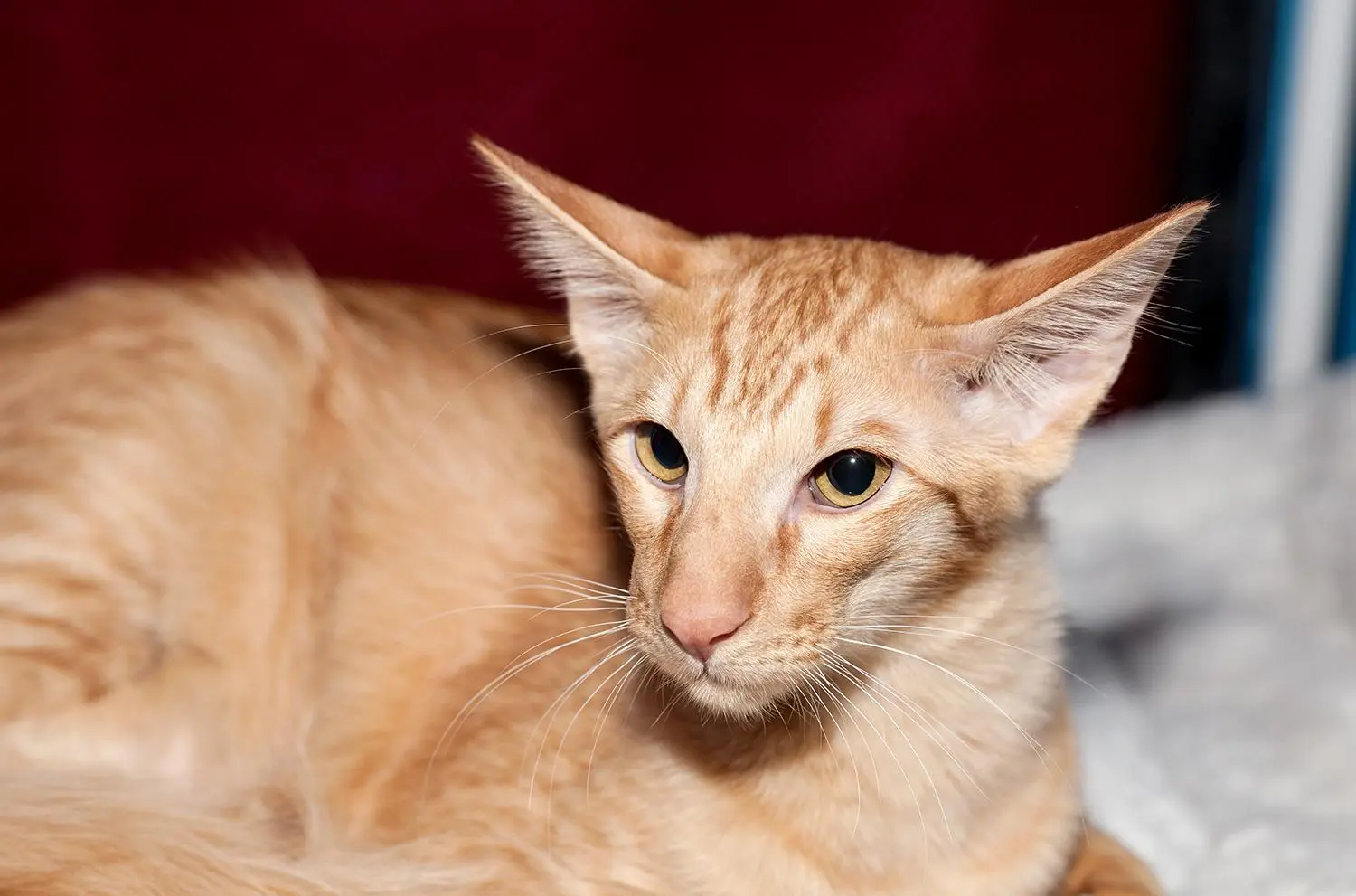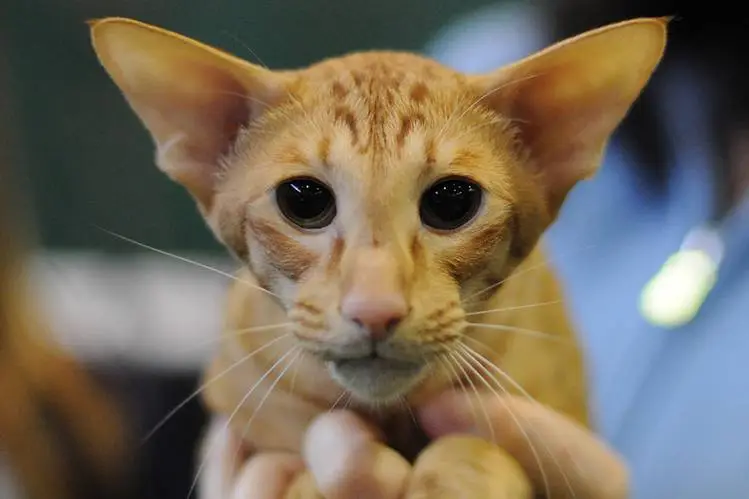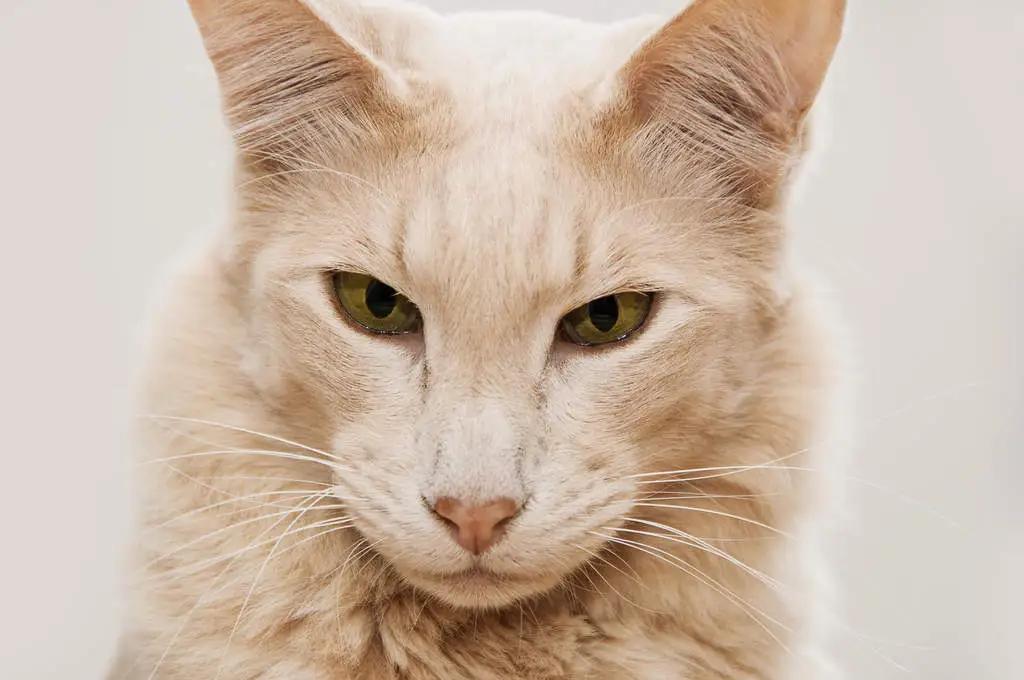Javanese Cat breed
Introduction
The Javanese cat breed is a captivating feline with a name that evokes the mystical allure of its origins. Named after the Indonesian island of Java, this breed holds a significant place in the hearts of cat enthusiasts worldwide.
One of the key characteristics that set the Javanese breed apart is its luxurious, silky coat, which drapes elegantly over its slender frame. This coat comes in a variety of colors and patterns, adding to the breed’s visual appeal. Another distinguishing feature is its striking blue eyes, which are often almond-shaped, giving the Javanese an enigmatic gaze that mesmerizes anyone who beholds it.

Despite its regal appearance, the Javanese cat is known for its playful and affectionate nature. These cats form strong bonds with their human companions and thrive on attention and interaction. They are often described as being dog-like in their devotion, following their owners from room to room and eagerly participating in household activities.
Furthermore, the Javanese breed is renowned for its intelligence and agility. These cats excel in activities that stimulate their minds, such as puzzle toys and interactive games. Their athletic prowess and keen intellect make them adept at learning tricks and mastering new challenges.
In summary, the Javanese cat breed captivates with its stunning appearance, affectionate personality, and impressive intelligence. Whether lounging in the sun or engaging in playful antics, these enchanting felines never fail to leave a lasting impression.
Table of Contents
I. Origin and History of Javanese Cat Breed :
Geographical Region of Origin :
- Developed primarily in North America, not on the island of Java as the name might suggest.
Formation of the Breed :
- Result of selective breeding efforts to create a long-haired version of the Siamese cat.
- Crossbreeding Siamese cats with Balinese cats (essentially long-haired Siamese).
Breeds Involved in Formation :
- Siamese cat: Contributed distinctive pointed coat and striking blue eyes.
- Balinese cat: Provided long-haired genetics and elegance.
Name and Significance :
- Despite its name, the breed’s development occurred outside of Java.
- The name evokes exoticism and mystique, enhancing its allure.
Influence of Origin on Characteristics :
- Siamese ancestry: Vocal nature, social personality.
- Balinese heritage: Luxurious coat, elegant physique.
Folklore or Legends :
- No specific tales exist, but the breed’s creation reflects human intervention to refine desired traits in domesticated animals.
Characteristics Today :
- Striking appearance, affectionate nature, playful disposition.
- Recognized globally as a beloved companion for cat enthusiasts.
II. Physical Characteristic of Javanese Cats :
| Height | Medium-sized cat breed, typically ranging from 8 to 10 inches (20 to 25 cm) at the shoulder. |
| Weight | Javanese cats usually weigh between 5 to 10 pounds (2.3 to 4.5 kg). |
| Life Span | Javanese cats have a relatively long lifespan, typically ranging from 12 to 15 years or more with proper care. |
| Good With | Javanese cats are generally good with families, including children and other pets. They thrive in households with plenty of attention and social interaction. |
| Temperament | Known for their affectionate and social nature, Javanese cats are outgoing and enjoy being involved in household activities. They are vocal and enjoy communicating with their human companions. |
| Intelligence | Javanese cats are highly intelligent and curious. They enjoy interactive play and can quickly learn tricks and games that stimulate their minds. |
| Shedding Amount | Javanese cats have minimal shedding compared to other long-haired breeds. Their silky coat requires regular grooming to prevent matting and reduce shedding. |
| Grooming | Regular grooming is essential for Javanese cats to maintain their luxurious coat. Brushing several times a week helps to remove loose hair and prevent mats. |
| Exercise Needs | While they are not overly active, Javanese cats enjoy playtime and interactive toys that provide mental and physical stimulation. Daily play sessions are recommended to keep them happy and healthy. |
| Energy Level | Javanese cats have a moderate energy level. They enjoy both lounging around the house and engaging in playful activities. |
| Meowing Level | Javanese cats are known for their vocal nature and may meow to communicate with their owners. They enjoy conversations and may express themselves through various vocalizations. |
| Drool amount | Javanese cats typically do not drool excessively. |
| Coat Length/Texture | Javanese cats have a long, silky coat that drapes elegantly over their slender bodies. The texture is fine and soft to the touch. |
| Colors | Javanese cats come in a variety of colors, including seal, blue, chocolate, and lilac, among others. |
| Patterns | They often display color points similar to the Siamese breed, with darker coloration on their ears, face, paws, and tail, against a lighter body color. |

Size :
- Male Javanese cats typically weigh between 8 to 12 pounds (3.6 to 5.4 kg), with a height ranging from 9 to 10 inches (23 to 25 cm) at the shoulder.
- Female Javanese cats are generally smaller, weighing between 5 to 8 pounds (2.3 to 3.6 kg) and standing at a height of 8 to 9 inches (20 to 23 cm).
Coat Type:
- The Javanese cat breed has a long, silky coat that is soft to the touch and lacks an undercoat, making it less prone to matting.
Color Variations:
- Javanese cats come in various color variations, including:
- Seal: Dark brown points with a light brown body.
- Blue: Slate blue points with a bluish-white body.
- Chocolate: Dark brown points with a warm beige body.
- Lilac: Frosty grey points with a pale cream body.
- Flame: Creamy orange points with a light cream body.
- Cream: Light cream points with a pale cream body.
- Tortie: Various combinations of the above colors with patches of red or cream.
Coat Texture and Length:
- The coat of the Javanese breed is fine, silky, and without an undercoat. It drapes elegantly over the cat’s body, accentuating its graceful appearance.
Distinctive Features:
- Ear Shape: Javanese cats have large, pointed ears that are proportionate to the size of their head. The ears are set wide apart and contribute to the breed’s alert and attentive expression.
- Tail Characteristics: The tail of the Javanese cat is long and slender, in harmony with its overall sleek and elegant appearance.
- Color Pointing: Similar to Siamese cats, Javanese cats have color points on their ears, face, paws, and tail, contrasting against a lighter body color. This distinctive pattern is a hallmark of the breed.
- Almond-Shaped Eyes: Javanese cats have striking blue eyes that are almond-shaped, adding to their enigmatic and captivating gaze.
- Slender Body: The Javanese breed is known for its slender, athletic build, with long legs and a lithe physique that reflects its agile nature.
These distinctive physical traits combine to give the Javanese cat breed a unique and alluring appearance that sets it apart from other feline breeds.
III. Temperament and Personality of Javanese Cats :
General Demeanor:
- The Javanese cat breed is known for its affectionate and sociable nature, often seeking out human companionship.
- They are outgoing and enjoy being involved in household activities, making them excellent companions for families.
- Javanese cats are vocal and enjoy communicating with their owners through meows, chirps, and other vocalizations.
Friendliness and Sociability:
- Javanese cats are typically friendly and sociable with both humans and other pets.
- They form strong bonds with their human family members and enjoy spending time interacting and cuddling.
Common Behavioral Traits:
- Playfulness: Javanese cats are energetic and playful, enjoying interactive games and toys that stimulate their minds and bodies.
- Curiosity: They are naturally curious cats and enjoy exploring their surroundings. Providing enrichment activities and toys can help satisfy their curious nature.
- Vocalization: Javanese cats are known for being vocal and expressive, often engaging in conversations with their owners.
- Attention-Seeking: They thrive on attention and may follow their owners around the house, wanting to be involved in all activities.
Challenges:
- Separation Anxiety: Javanese cats may develop separation anxiety if left alone for extended periods. Providing enrichment activities and interactive toys can help alleviate boredom and anxiety.
- Demanding Attention: They may be demanding of attention and may meow persistently to get their owner’s attention. Setting boundaries and providing scheduled playtime can help manage this behavior.
Managing Breed-Specific Behavior Issues:
- Socialization: Early socialization is essential for Javanese cats to ensure they are comfortable around people and other pets.
- Interactive Play: Providing interactive toys and play sessions can help satisfy their need for mental and physical stimulation.
- Positive Reinforcement: Use positive reinforcement techniques, such as treats and praise, to encourage desirable behaviors.
- Consistency: Consistent routines and boundaries help Javanese cats feel secure and can prevent behavioral issues from developing.
Addressing Behavior Issues:
- If behavioral issues arise, it’s essential to address them promptly and positively. Consultation with a veterinarian or professional animal behaviorist may be beneficial in developing a behavior modification plan tailored to your cat’s needs.
- Avoid punishment-based training methods, as these can lead to fear and anxiety in your cat.
Overall, with proper socialization, attention, and enrichment, Javanese cats can make wonderful companions with their loving and playful personalities.

IV. Care and Maintenance of Javanese Cat Breed :
Grooming Needs :
- Due to their long, silky coats, Javanese cats require regular grooming to prevent matting and tangling.
- Brush your Javanese cat’s coat at least a few times a week using a fine-toothed comb or a slicker brush to remove loose hair and prevent knots.
- Pay special attention to areas prone to matting, such as behind the ears and under the armpits.
- Regular nail trimming and dental care are also essential aspects of grooming for Javanese cats.
Health Consideration :
Like all cat breeds, Javanese cats may be prone to certain health issues, including:
- Dental problems: Regular dental care, including brushing your cat’s teeth and providing dental treats, can help prevent dental issues.
- Respiratory issues: Javanese cats may be more susceptible to respiratory infections due to their brachycephalic (short-nosed) facial structure.
- Obesity: Monitor your Javanese cat’s diet and weight to prevent obesity, which can lead to various health problems.
Nutrition :
- Provide a balanced and nutritious diet tailored to your Javanese cat’s age, weight, and activity level.
- Choose high-quality cat food that is formulated to meet the nutritional needs of cats, with a focus on protein and essential nutrients.
- Avoid overfeeding and monitor your cat’s weight to prevent obesity.
- Fresh water should be available at all times to keep your Javanese cat hydrated.
Exercise :
- While not overly active, Javanese cats enjoy playtime and mental stimulation.
- Provide interactive toys and games to keep them engaged and entertained.
- Schedule regular play sessions with your Javanese cat to satisfy their need for physical activity and mental stimulation.
Additional Tips :
- Create a safe and stimulating environment for your Javanese cat with plenty of opportunities for exploration and play.
- Ensure your cat has access to scratching posts or pads to help maintain their claws and satisfy their natural scratching instincts.
- Provide regular veterinary care, including vaccinations, parasite prevention, and spaying/neutering if not planning to breed.
- Keep your Javanese cat indoors to protect them from potential hazards such as traffic, predators, and disease.
- Spend quality time bonding with your cat through cuddling, grooming, and interactive play sessions to strengthen your relationship and meet their social needs.
By providing proper care and attention, you can ensure that your Javanese cat remains healthy, happy, and well-adjusted throughout their life.
V. Suitability of Javanese Cats :
Compatibility with Children and Other Animals:
- Javanese cats are typically well-suited for families with children. They are known for their friendly and sociable nature, often forming strong bonds with their human family members, including children.
- They are generally tolerant of gentle handling and enjoy interactive play with children. However, it’s essential to teach children how to properly interact with cats to prevent accidental injuries.
- Javanese cats are also usually accepting of other pets in the household, including dogs and other cats. Proper introductions and gradual acclimation can help ensure harmonious relationships between pets.
Special Considerations for Multi-Pet Households:
- When introducing a Javanese cat to an existing pet, it’s essential to proceed slowly and carefully to minimize stress and potential conflicts.
- Start by allowing the pets to become familiar with each other’s scents by swapping bedding or using a pheromone diffuser.
- Gradually introduce the pets in controlled environments, such as through a cracked door or baby gate, allowing them to see and smell each other without direct contact.
- Supervise initial interactions closely and intervene if any signs of aggression or stress occur. Provide plenty of positive reinforcement and treats to reward calm and friendly behavior.
- With patience and proper introductions, Javanese cats can usually adapt well to multi-pet households and form positive relationships with other animals.
Environmental Needs:
- Javanese cats are adaptable and can thrive in various living environments, including apartments and houses.
- They enjoy having access to vertical space, such as cat trees or shelves, where they can climb and observe their surroundings.
- Provide plenty of toys and interactive games to keep your Javanese cat mentally and physically stimulated, especially if they are indoor-only cats.
- Ensure your home environment is safe and free from potential hazards, such as toxic plants, open windows, and small objects that could be ingested.
- Javanese cats generally prefer moderate temperatures and may seek out warm, sunny spots for lounging. Ensure they have access to comfortable sleeping areas and shelter from extreme heat or cold.
By considering the temperament and needs of the Javanese cat breed, as well as taking appropriate steps to introduce them to children and other pets, they can make wonderful additions to family households and multi-pet environments. Providing a safe and enriching living environment will help ensure that your Javanese cat thrives and settles in well to their new home.

VI. Adoption and Breeder Consideration of Javanese Cat Breed :
Adoption from Shelters or Rescue Organizations:
- Encouraging adoption from shelters or rescue organizations is a wonderful way to provide a loving home to a cat in need.
- Benefits of adoption include:
- Saving a life: By adopting from a shelter, you are giving a cat a second chance at life.
- Supporting animal welfare: Adopting from shelters helps reduce overcrowding and supports organizations dedicated to animal rescue and welfare.
- Finding the right fit: Shelters often have a variety of cats with different personalities and temperaments, allowing you to find a cat that matches your lifestyle and preferences.
- Adopting a Javanese cat from a shelter or rescue organization can be a rewarding experience, knowing that you are providing a loving home to a cat in need.
Selecting a Reputable Breeder:
- If purchasing a purebred Javanese cat from a breeder, it’s essential to select a reputable breeder who prioritizes ethical breeding practices and the health and well-being of their cats.
- Look for breeders who are transparent about their breeding practices and are willing to provide information about the cat’s lineage, health history, and genetic testing.
- Ask for references from previous customers and visit the breeder’s facility to ensure it is clean, well-maintained, and the cats are well-cared for.
- Reputable breeders will often provide health guarantees and contracts outlining the terms of the sale, including spaying/neutering requirements and return policies.
Cost Considerations:
- The cost of adopting or purchasing a Javanese cat can vary depending on factors such as location, breeder reputation, and the cat’s pedigree.
- Adoption fees from shelters or rescue organizations are typically lower than purchasing from a breeder and may include vaccinations, spaying/neutering, and microchipping.
- Purchasing a purebred Javanese cat from a reputable breeder can be more expensive, with prices ranging from several hundred to over a thousand dollars, depending on the cat’s quality and lineage.
- In addition to the initial cost of acquiring the cat, consider ongoing expenses such as veterinary care, grooming, food, and supplies when budgeting for a new pet.
Whether adopting from a shelter or purchasing from a breeder, it’s important to prioritize the welfare of the cat and ensure that you are prepared to provide a loving and responsible home for the lifetime of the pet.
VII. Conclusion
The Javanese cat breed is renowned for its stunning appearance, characterized by a long, silky coat and striking blue eyes. They are affectionate, social cats who form strong bonds with their human family members and enjoy interactive play and companionship. Javanese cats have a playful and curious nature, combined with intelligence and agility, making them excellent companions for families and individuals alike.
Responsible ownership involves providing a loving and safe environment for your Javanese cat, meeting their physical and emotional needs, and ensuring their health and well-being. Proper care includes regular grooming, veterinary check-ups, a balanced diet, and plenty of mental and physical stimulation. Prospective owners should carefully consider all aspects of cat ownership, including the financial and time commitments involved, before bringing a Javanese cat into their home. Adoption from shelters or rescue organizations is encouraged to provide a loving home to cats in need, while purchasing from reputable breeders should prioritize ethical breeding practices and the health of the cats.
In conclusion, the Javanese cat breed offers beauty, companionship, and intelligence to those who welcome them into their homes. Responsible ownership and proper care ensure a fulfilling and rewarding relationship between owner and cat, enriching both lives for years to come.

FAQ about Javanese Cat Breed :
How much does a Javanese cat cost?
The cost of adopting or purchasing a Javanese cat can vary depending on factors such as location, breeder reputation, and the cat’s pedigree. Adoption fees from shelters are typically lower than purchasing from breeders, which can range from several hundred to over a thousand dollars.
Are Javanese cats good pets for families?
Yes, Javanese cats are excellent pets for families. They are affectionate, social, and enjoy interacting with children and other pets.
How long do Javanese cats typically live?
Javanese cats have a relatively long lifespan, typically ranging from 12 to 15 years or more with proper care.
Are Javanese cats prone to any health issues?
Like all cat breeds, Javanese cats may be prone to certain health issues, including dental problems, respiratory issues, and obesity. Regular veterinary check-ups are essential for maintaining their health.







